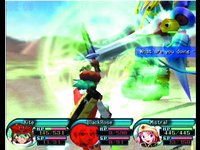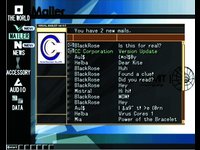|
|

|
PLATFORM
|
PS2
|
BATTLE SYSTEM
|

|
INTERACTION
|

|
ORIGINALITY
|

|
STORY
|

|
MUSIC & SOUND
|

|
VISUALS
|

|
CHALLENGE
|
Moderate
|
COMPLETION TIME
|
Less than 20 Hours
|
|
OVERALL

|
+ Storytelling continues to be excellent.
+ Original premise.
+ Combat has improved slightly.
- Action-oriented combat too reliant on menus.
- Ugly environments.
- Weak AI.
|
Click here for scoring definitions
|
|
|
Back in 2003, the .hack games were released three months apart, and the wait between was probably somewhat frustrating. Being able to play them back to back, however, comes with certain revelations. Specifically, it becomes apparent just how short these games truly are. Starting with .hack//Infection and having now gone through .hack//Mutation, my game clock only reads thirty-two hours, the typical length of a standalone RPG. Had I paid full price for these games when they were released, their mediocre nature and prohibitive cost would certainly have made me unjustly skeptical of its eventual successor, .hack//G.U. Thankfully that didn't happen. In any case, .hack//Mutation is the second part of the original .hack quadrilogy, and it's really just more of the same.
.hack//Mutation begins right where Infection left off. With Skeith dead and the monstrous Cubia appearing in his wake, Kite and BlackRose are no longer sure just what it is they're up against. The girl Aura was destroyed, and to make matters worse, the system administrator Lios has decided to force them to cooperate with his own efforts, or lose their character data. With no other clues to go on, Kite and BlackRose reluctantly begin investigating per Lios's instructions in their continued efforts to unravel the mysteries of "The World." The story is, once again, the main, and really, only draw that .hack//Mutation brings to the table, but thankfully it continues to be quite good. The unique method of storytelling introduced in Infection continues to work wonderfully, but the game's brevity and large quantities of time spent wandering dungeons really manage to hamper it. For Mutation's part, the story really fails to advance very far past what's outlined above, save for the finale which once again sets up a major cliffhanger to prepare for the next volume.
 Get used to seeing dead characters.
Get used to seeing dead characters.
|
|
Interestingly, combat has actually managed to improve somewhat from the previous installment. Unfortunately, this is not in the form of fixed gameplay mechanics, which are still as clunky and awkward as ever. Rather, it is from a significantly increased difficulty that requires skills be used at a much more frequent pace. Enemies hit a lot harder than in Infection, and enemies with near-untouchable evasion rates or even complete physical immunities are much more common, forcing the player to rely on magic a lot more often. High-health enemies are also significantly more common, which means the game's elemental system sees much more abuse. While this makes combat a lot more involved than it was in Infection, it also serves to highlight the poor design of the user interface. Opening menus every two or three seconds to use items, issue AI commands, or cast skills and spells breaks the flow of combat, and in the end winds up feeling more like an extremely frantic turn-based game rather than an action-RPG. At they very least, it's much more involved than previously, which is certainly a good thing.
The increased difficulty brings many of Infection's less noticeable problems to the foreground, unfortunately. Most notably is how death is handled within the game. When a character is resurrected after death, their SP is reduced to zero, regardless of its former level. With an increased reliance on skills, this innocuous, minor irritation from Infection can sometimes serve as a death sentence. If party members die, their usefulness is suddenly crippled. If a Wavemaster, the game's magic class, dies, he is quite literally completely useless until his SP is recovered. Considering that Wavemasters are generally in charge of the healing, it can be a very gut-wrenching experience trying to recover before the rest of the party is wiped out as well. Escape is impossible inside dungeons, and death means starting the dungeon over from scratch. Consumable items, particularly SP healing items, are infinitely more important, and players can expect to burn through several in each dungeon.
Kite's Data Drain ability also comes into play a lot more often, not only to make certain battles that would be otherwise overwhelming a lot easier, but also to acquire virus cores for gate hacking, which is also a more common occurence, and is one of the game's more significant irritations. While Infection featured a small amount of gate hacking and required the player to acquire a small number of virus cores, Mutation seems to feature almost nothing but gate hacking. At least half, if not more, of the dungeons that Kite and company visit during the course of the game require a variety of different virus cores to access, and in all likelihood, players will find themselves going into random dungeons simply to acquire the necessary cores at several points in the story. Considering this really adds nothing to the story or the game, it can get quite annoying.
 Emails help tell the story.
Emails help tell the story.
|
|
Outside of dungeon-crawling, players can once again immerse themselves in the game's addictive barter system, emails, news clips, message board posts, and side quests. Players who carry data over from .hack//Infection may be able to acquire some of the best gear in the game very early on if they held on to trade fodder. Grunty-raising returns, and in addition, players dedicated enough to raise several different kinds can participate in Grunty races. A handful of new optional characters make appearances, and players who recruited optional characters in Infection can participate in new side quests for each.
.hack//Mutation is just as ugly as Infection. The character designs and models are still as solid as ever, but the environments really fail to provide an interesting world to interact with. Overused, repeating textures are the biggest offender, the result of algorithm-generated dungeons. The audio is similar to Infection as well. The music is mostly pleasant, and sound effects are used wonderfully. The voice acting could use some work, but it's not terrible, all things considered.
.hack//Mutation manages to improve upon what Infection began very slightly, but not significantly enough to be able to call it a good game. It's still markedly below average, but its uniquely told and intriguing storyline should have little trouble in captivating players and keeping them interested in the game. The increased challenge to combat can even provide a bit of fun, despite its frustrating interface. The game's biggest detractor is simply that, between it and its predecessor, it barely adds up to a single game, which makes its price point, even second-hand, rather high.
Review Archives
|









